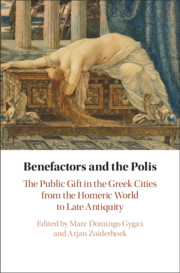 Benefactors and the Polis
Benefactors and the Polis from Part IV - Benefactors and the Polis under Rome
Published online by Cambridge University Press: 21 January 2021
This chapter investigates the dynamics of material and symbolic exchange between Roman emperors and Greek cities, and the role of the emperor in the ideology and practice of civic euergetism in the Greek East, in the middle Roman empire (c. 98–180 CE). It begins by documenting the absence of demonstrable correlations between (1) an imperial visit and an imperial benefaction to a city and (2) an imperial visit and the erection of an honorific statue for the reigning emperor. On this basis it is argued that an imperial visit was not the critical moment for generating reciprocal exchanges between emperor and city, as is normally thought, and that local honours for the emperor were not usually triggered by the provision or even the prospect of specific imperial benefactions to the city. The bulk of the chapter then draws out the implications – both ideological and practical – of this peculiar form of ‘abstract reciprocity’ between Roman emperors and Greek cities, arguing that this type of idealized benefaction and local honorific practice defines this phase in the long history of civic euergetism in the Greek polis.
To save this book to your Kindle, first ensure [email protected] is added to your Approved Personal Document E-mail List under your Personal Document Settings on the Manage Your Content and Devices page of your Amazon account. Then enter the ‘name’ part of your Kindle email address below. Find out more about saving to your Kindle.
Note you can select to save to either the @free.kindle.com or @kindle.com variations. ‘@free.kindle.com’ emails are free but can only be saved to your device when it is connected to wi-fi. ‘@kindle.com’ emails can be delivered even when you are not connected to wi-fi, but note that service fees apply.
Find out more about the Kindle Personal Document Service.
To save content items to your account, please confirm that you agree to abide by our usage policies. If this is the first time you use this feature, you will be asked to authorise Cambridge Core to connect with your account. Find out more about saving content to Dropbox.
To save content items to your account, please confirm that you agree to abide by our usage policies. If this is the first time you use this feature, you will be asked to authorise Cambridge Core to connect with your account. Find out more about saving content to Google Drive.